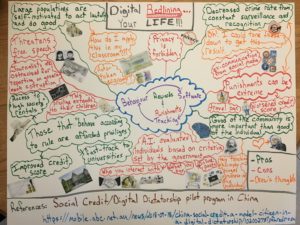Digital redlining your life – A commentary on China’s digital dictatorship pilot program

Prior to reviewing this text, I was somewhat oblivious to the concept of monitoring a population for automated self-motivation…
In this video, I summarize my comments on the contents of “Leave No Dark Corner” piece prepared by Matthew Carney (see link at the bottom of this page). Using the application titled “Stop Motion”, I created an audio assisted mind map of the pros and cons of behaviour tracking software with a punishment/rewards economy attached. The video was uploaded to YouTube so that it could be linked here (below).
A few key points that I touch on include: The parts of the text that offered new ideas
- How privacy is seemingly forbidden when this type of system is implemented.
- How large populations of people are self-motivated to act within the law, and to do good (here, I ask the question “how could I make this work in my classroom and offer perhaps an auto-token economy of some sort).
- A system like this has been shown to kill free speech (e.g., a journalist was punished for his checks on possible government corruption).
- Those that behave according to rule are afforded privileges (such as improved credit score, access to high society, and fast-track acceptance to university). These privileges are passed on to their children. I wonder, do the punishments get automatically shifted to the children of offenders, too?
- Punishments can be extreme (such as ex-communication from social media, being banned from travelling, and a lowered credit score).
- However, there is a theoretical decrease in crime rate that should ensue as constant surveillance coupled with facial recognition software improves. I wonder if a method of constant supervision in the classroom could be employed to allow students to self-mediate without potential punishments that are a bit toned down.
- How artificial intelligence evaluates individuals based on criteria that is set by the government. You are judged based on such things as who you interact with, what you buy, and what you post online. All things affecting your “social score”. I wonder, how long until the advertising algorithms follow suit with this type of technology (fortunately for China, capitalism is still somewhat frowned upon).
- Finally, in this piece they emphasize how the good of the community is more important than the good of the individual. This, to me, makes sense to a certain degree for general population. However, in the classroom, I prefer to offer more of an individual approach to teaching (each student is important in their own way).
